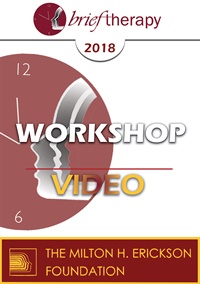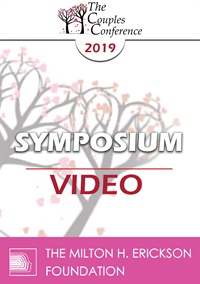Credit available - Click Here for more information
- Average Rating:
- Not yet rated
- Topic Areas:
- Workshops | Psychobiological Approach to Couples Therapy (PACT) | Continuing Education | Couples Therapy
- Categories:
- Brief Therapy Conference | Brief Therapy Conference 2018 | Online Continuing Education | Pioneers in Couples and Family Therapy
- Faculty:
- Stan Tatkin, PsyD, MFT
- Course Levels:
- Master Degree or Higher in Health-Related Field
- Duration:
- 2:00:42
- Format:
- Audio and Video
- Original Program Date:
- Dec 07, 2018
- Short Description:
- This workshop explores projective identification in couple therapy—a powerful yet often overlooked dynamic where partners unconsciously project disowned feelings onto each other. Through video demonstrations and clinical techniques like cross-tracking and circular questioning, therapists learn to spot nonverbal cues and emotional undercurrents. Emphasizes brain-based strategies and practical interventions to decode implicit communication and accelerate therapeutic progress.
- Price:
-
Sale is $29.00
price reduced from Base Price - $59.00
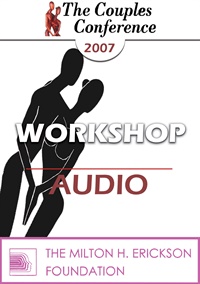
- Average Rating:
- Not yet rated
- Topic Areas:
- Workshops | Couples Therapy | Personality Disorders | Psychobiological Approach to Couples Therapy (PACT) | Developmental Psychology
- Categories:
- Couples Conference | Couples Conference 2007 | Pioneers in Couples and Family Therapy
- Faculty:
- Stan Tatkin, PsyD, MFT
- Duration:
- 2:17:46
- Format:
- Audio Only
- Original Program Date:
- Apr 27, 2007
- Short Description:
- A developmental-psychobiological approach to treating challenging couples, focusing on real-time regulation, attachment patterns, and nervous system dynamics. Emphasizing mutual expertise, quick repair, and interactive regulation, the model shifts from content-based conflict to addressing core relational deficits. Techniques include joint sessions, humor, video playback, and brief interventions for sustained progress.
- Price:
- $15.00 - Base Price
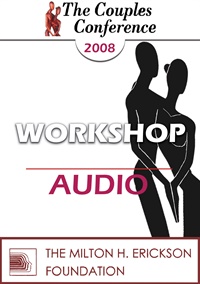
- Average Rating:
- Not yet rated
- Topic Areas:
- Workshops | Addiction | Attachment | Couples Therapy | Personality Disorders | Avoidant | Psychobiological Approach to Couples Therapy (PACT)
- Categories:
- Couples Conference | Couples Conference 2008 | Pioneers in Couples and Family Therapy
- Faculty:
- Stan Tatkin, PsyD, MFT
- Duration:
- 2:24:28
- Format:
- Audio Only
- Original Program Date:
- Apr 27, 2008
- Short Description:
- Avoidant attachment can resemble disorders of the self, such as narcissistic or schizoid presentations, where partners rely heavily on auto-regulation and disengage from mutual emotional attunement. This workshop examines how such dynamics play out in romantic relationships, offering practical strategies—like proximity-based interventions and structured dyadic exercises—to support co-regulation and foster secure relating.
- Price:
- $15.00 - Base Price
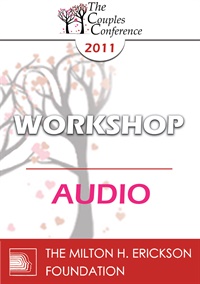
- Average Rating:
- Not yet rated
- Topic Areas:
- Workshops | Couples Therapy | Psychobiological Approach to Couples Therapy (PACT) | Neurobiology
- Categories:
- Couples Conference | Couples Conference 2011 | Pioneers in Couples and Family Therapy
- Faculty:
- Stan Tatkin, PsyD, MFT
- Duration:
- 1:56:30
- Format:
- Audio Only
- Original Program Date:
- Apr 03, 2011
- Short Description:
- This workshop presents a psychobiological approach to couples therapy, focusing on nonverbal communication, attachment styles, and arousal regulation. Techniques include frame-by-frame video analysis, movement-based assessments, and real-time biofeedback. Practical tools like camera setup, rolling chairs, and video playback are used to enhance therapist attunement, mutual regulation, and client insight—while underscoring ethical tech use and client privacy.
- Price:
- $15.00 - Base Price
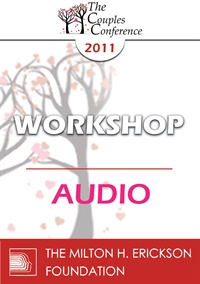
- Average Rating:
- Not yet rated
- Topic Areas:
- Couples Therapy | Workshops | Psychobiological Approach to Couples Therapy (PACT) | Neurobiology
- Categories:
- Couples Conference | Couples Conference 2011 | Pioneers in Couples and Family Therapy
- Faculty:
- Stan Tatkin, PsyD, MFT
- Duration:
- 2:05:40
- Format:
- Audio Only
- Original Program Date:
- Apr 03, 2011
- Short Description:
- This workshop explains and proves the meaning of the title, that romantic partners mostly do not know what they are doing or why. Tatkin explores a psychobiological approach to couples therapy, emphasizing attachment styles, neurobiology, and nonverbal communication. Topics include stress regulation via the amygdala and vagus nerve, the role of the right hemisphere in emotional processing, and techniques like voice modulation and play. Case examples illustrate how brief, affect-driven interventions help partners co-regulate, manage conflict, and improve relational dynamics.
- Price:
- $15.00 - Base Price
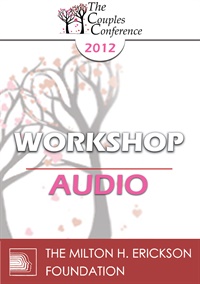
- Average Rating:
- Not yet rated
- Topic Areas:
- Couples Therapy | Workshops | Psychobiological Approach to Couples Therapy (PACT) | Therapist Techniques
- Categories:
- Couples Conference | Couples Conference 2012 | Pioneers in Couples and Family Therapy
- Faculty:
- Stan Tatkin, PsyD, MFT
- Duration:
- 1:28:49
- Format:
- Audio Only
- Original Program Date:
- Apr 27, 2012
- Short Description:
- Introduces a psychobiological approach to couple therapy that shifts from insight-based to experiential methods. Using bottom-up techniques—like surprise interventions, movement, and the Lover’s Pose—therapists can access implicit systems through micro-expressions and body cues, helping couples regulate arousal, deepen attachment, and build secure-functioning relationships.
- Price:
- $15.00 - Base Price

CC12 Workshop 14 – Focusing on Deficits in Couple Therapy: The PACT® Methodology – Stan Tatkin, PsyD
- Average Rating:
- Not yet rated
- Topic Areas:
- Workshops | Psychobiological Approach to Couples Therapy (PACT) | Couples Therapy | Mindfulness
- Categories:
- Couples Conference | Couples Conference 2012 | Pioneers in Couples and Family Therapy
- Faculty:
- Stan Tatkin, PsyD, MFT
- Duration:
- 1:51:28
- Format:
- Audio Only
- Original Program Date:
- Apr 29, 2012
- Short Description:
- This workshop explores how social-emotional deficits like alexithymia, affect blindness, and poor theory of mind disrupt co-regulation and erode relational security. Tatkin offers practical tools for assessing such deficits, distinguishing them from defenses, and guiding couples toward clearer emotional signaling, mutual understanding, and more accurate attribution under stress.
- Price:
- $15.00 - Base Price
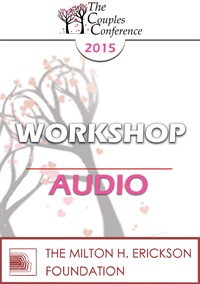
- Average Rating:
- Not yet rated
- Topic Areas:
- Couples Therapy | Workshops | Psychobiological Approach to Couples Therapy (PACT) | Therapist Development
- Categories:
- Couples Conference | Couples Conference 2015 | Pioneers in Couples and Family Therapy
- Faculty:
- Stan Tatkin, PsyD, MFT
- Duration:
- 1:54:28
- Format:
- Audio Only
- Original Program Date:
- Apr 24, 2015
- Short Description:
- This workshop explores couple therapy with highly disorganized partners, where therapeutic structure and stance are essential. Using attachment, regulation, and neurobiological models, it addresses trauma-related dysregulation. Clinical examples illustrate how facial cues, pacing, and therapist attunement support emotional regulation and relational repair in the face of volatility.
- Price:
- $15.00 - Base Price
- Average Rating:
- Not yet rated
- Topic Areas:
- Couples Therapy | Keynotes | Psychobiological Approach to Couples Therapy (PACT)
- Categories:
- Couples Conference | Couples Conference 2016 | Pioneers in Couples and Family Therapy
- Faculty:
- Stan Tatkin, PsyD, MFT
- Course Levels:
- Master Degree or Higher in Health-Related Field
- Duration:
- 51:04
- Format:
- Audio and Video
- Original Program Date:
- May 13, 2016
- Short Description:
- This session presents a psychobiological approach to guiding couples toward secure functioning—where partners act as a cooperative, principle-driven system. Tatkin demonstrates cross-dialogic techniques for clarifying attachment strategies, desires, and hidden agendas. Emphasizing non-verbal attunement, state-dependent perception, and strategic therapist stance, the model offers clinicians tools to decode implicit dynamics and foster lasting relational alignment.
- Price:
-
Sale is $29.00
price reduced from Base Price - $59.00
- Average Rating:
- Not yet rated
- Topic Areas:
- Couples Therapy | Workshops | Deception | Psychobiological Approach to Couples Therapy (PACT)
- Categories:
- Couples Conference | Couples Conference 2016 | Pioneers in Couples and Family Therapy
- Faculty:
- Stan Tatkin, PsyD, MFT
- Course Levels:
- Master Degree or Higher in Health-Related Field
- Duration:
- 02:10:07
- Format:
- Audio and Video
- Original Program Date:
- May 13, 2016
- Short Description:
- This session explores deception in couples therapy through a psychobiological lens, integrating attachment, arousal regulation, and neuroscience. Tatkin highlights the limits of conscious awareness in relational conflict and the role of implicit memory and nonverbal cues in uncovering hidden agendas. Using tools like digital video analysis, cross-questioning, and presumptive statements, therapists are guided to promote secure functioning and foster repair following betrayal.
- Price:
-
Sale is $29.00
price reduced from Base Price - $59.00

- Average Rating:
- Not yet rated
- Topic Areas:
- Addiction | Deception | Keynotes | Psychobiological Approach to Couples Therapy (PACT) | Couples Therapy | Infidelity
- Categories:
- Couples Conference | Couples Conference 2017 | Pioneers in Couples and Family Therapy
- Faculty:
- Stan Tatkin, PsyD, MFT
- Duration:
- 55:09
- Format:
- Audio Only
- Original Program Date:
- Apr 01, 2017
- Short Description:
- This presentation examines deception in couple therapy through psychobiological and neurobiological frameworks. Tatkin advocates for cross-disciplinary learning—drawing from neuroscience and animal behavior—to sharpen clinical perception. Emphasis is placed on detecting deception early through micro expressions, behavioral cues, and video analysis, offering therapists strategic tools for addressing affairs, addictions, and trust breaches in relational work.
- Price:
- $15.00 - Base Price

- Average Rating:
- Not yet rated
- Topic Areas:
- Addiction | Deception | Keynotes | Psychobiological Approach to Couples Therapy (PACT) | Couples Therapy | Infidelity
- Categories:
- Couples Conference | Couples Conference 2017 | Pioneers in Couples and Family Therapy
- Faculty:
- Stan Tatkin, PsyD, MFT
- Course Levels:
- Master Degree or Higher in Health-Related Field
- Duration:
- 55:09
- Format:
- Audio and Video
- Original Program Date:
- Apr 01, 2017
- Short Description:
- This presentation examines deception in couple therapy through psychobiological and neurobiological frameworks. Tatkin advocates for cross-disciplinary learning—drawing from neuroscience and animal behavior—to sharpen clinical perception. Emphasis is placed on detecting deception early through micro expressions, behavioral cues, and video analysis, offering therapists strategic tools for addressing affairs, addictions, and trust breaches in relational work.
- Price:
-
Sale is $29.00
price reduced from Base Price - $59.00

- Average Rating:
- Not yet rated
- Topic Areas:
- Couples Therapy | Workshops | Betrayal | Psychobiological Approach to Couples Therapy (PACT)
- Categories:
- Couples Conference | Couples Conference 2017 | Pioneers in Couples and Family Therapy
- Faculty:
- Stan Tatkin, PsyD, MFT
- Duration:
- 2:08:41
- Format:
- Audio Only
- Original Program Date:
- Mar 31, 2017
- Short Description:
- This workshop examines betrayal in its many forms—infidelity, deception, secrecy—as a core challenge in couple therapy. Using a psychobiological lens, Tatkin emphasizes moving from self- to co-regulation and fostering secure-functioning partnerships built on transparency and mutual care. Techniques like crossing, declarations, and the “King and Queen” exercise help therapists structure repair and guide couples through trust restoration.
- Price:
- $15.00 - Base Price

- Average Rating:
- Not yet rated
- Topic Areas:
- Couples Therapy | Workshops | Betrayal | Psychobiological Approach to Couples Therapy (PACT)
- Categories:
- Couples Conference | Couples Conference 2017 | Pioneers in Couples and Family Therapy
- Faculty:
- Stan Tatkin, PsyD, MFT
- Course Levels:
- Master Degree or Higher in Health-Related Field
- Duration:
- 2:08:41
- Format:
- Audio and Video
- Original Program Date:
- Mar 31, 2017
- Short Description:
- This workshop examines betrayal in its many forms—infidelity, deception, secrecy—as a core challenge in couple therapy. Using a psychobiological lens, Tatkin emphasizes moving from self- to co-regulation and fostering secure-functioning partnerships built on transparency and mutual care. Techniques like crossing, declarations, and the “King and Queen” exercise help therapists structure repair and guide couples through trust restoration.
- Price:
-
Sale is $29.00
price reduced from Base Price - $59.00

- Average Rating:
- Not yet rated
- Topic Areas:
- Couples Therapy | Workshops | Conflict | Psychobiological Approach to Couples Therapy (PACT)
- Categories:
- Couples Conference | Couples Conference 2017 | Pioneers in Couples and Family Therapy
- Faculty:
- Stan Tatkin, PsyD, MFT
- Duration:
- 1:20:34
- Format:
- Audio Only
- Original Program Date:
- Apr 02, 2017
- Short Description:
- This workshop explores how to identify and resolve deal breakers—conflicts that, left unaddressed, threaten the viability of a relationship. Grounded in a psychobiological approach, Tatkin outlines a structured process that supports secure functioning, including techniques like cross-questioning, the five-minute argument, and amplifying conflict for clarity. Therapists are encouraged to take the long view, helping partners face uncomfortable truths while strengthening alliance and accountability.
- Price:
- $15.00 - Base Price
Credit available - Click Here for more information
- Average Rating:
- Not yet rated
- Topic Areas:
- Symposiums | Emotionally Focused Therapy (EFT) | Psychobiological Approach to Couples Therapy (PACT) | Attachment | Developmental Psychology
- Bundle(s):
- CC19 Main Conference Video Bundle | CC19 Individual Selections
- Categories:
- Couples Conference | Couples Conference 2019 | Online Continuing Education | Pioneers in Couples and Family Therapy
- Faculty:
- Sue Johnson, EdD | Stan Tatkin, PsyD, MFT
- Course Levels:
- Master Degree or Higher in Health-Related Field
- Duration:
- 55:52
- Format:
- Audio and Video
- Original Program Date:
- Apr 13, 2019
- Short Description:
- This dialogue between EFT and PACT highlights two distinct, research-informed approaches to couple therapy. Johnson presents EFT’s focus on attachment security, corrective emotional experiences, and systemic change. Tatkin emphasizes PACT’s attention to arousal regulation and real-time interaction. Together, they underscore the importance of attuned, principle-based interventions for lasting relational transformation.
- Price:
-
Sale is $29.00
price reduced from Base Price - $59.00
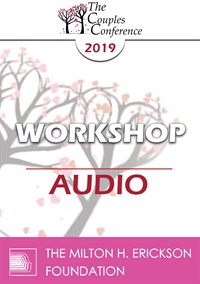
Credit available - Click Here for more information
- Average Rating:
- Not yet rated
- Topic Areas:
- Workshops | Psychobiological Approach to Couples Therapy (PACT) | Continuing Education | Couples Therapy
- Bundle(s):
- CC19 Main Conference Audio Bundle | CC19 Individual Selections
- Categories:
- Couples Conference | Couples Conference 2019 | Online Continuing Education | Pioneers in Couples and Family Therapy
- Faculty:
- Stan Tatkin, PsyD, MFT
- Duration:
- 1:55:42
- Format:
- Audio Only
- Original Program Date:
- Apr 13, 2019
- Short Description:
- PACT offers a fast-paced, polytheoretical approach that blends attachment theory, arousal regulation, and developmental neuroscience. This workshop trains therapists to assess microexpressions, distinguish defenses from deficits, and use creative interventions to move couples toward secure functioning. Emphasizing strategic, somatically informed techniques, PACT equips clinicians to work effectively with high-conflict and complex relational systems.
- Price:
- $15.00 - Base Price
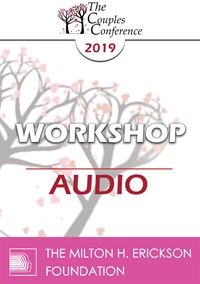
Credit available - Click Here for more information
- Average Rating:
- Not yet rated
- Topic Areas:
- Workshops | Psychobiological Approach to Couples Therapy (PACT) | Continuing Education | Couples Therapy
- Bundle(s):
- CC19 Main Conference Audio Bundle | CC19 Individual Selections
- Categories:
- Couples Conference | Couples Conference 2019 | Online Continuing Education | Pioneers in Couples and Family Therapy
- Faculty:
- Stan Tatkin, PsyD, MFT
- Duration:
- 2:03:44
- Format:
- Audio Only
- Original Program Date:
- Apr 13, 2019
- Short Description:
- PACT integrates attachment, neuroscience, and arousal regulation to treat complex relational dynamics. This workshop trains clinicians to identify somatic cues, use strategic interventions, and guide partners toward secure functioning. Through cross-tracking, staging, and deep data gathering, therapists learn to assess attachment, manage betrayal, and foster real-time collaboration—even in high-conflict or avoidant couples.
- Price:
- $15.00 - Base Price
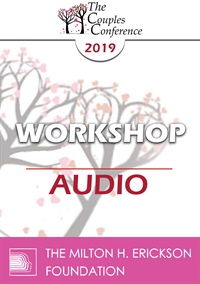
Credit available - Click Here for more information
- Average Rating:
- Not yet rated
- Topic Areas:
- Workshops | Psychobiological Approach to Couples Therapy (PACT) | Personality Disorders | Continuing Education | Couples Therapy
- Bundle(s):
- CC19 Main Conference Audio Bundle | CC19 Individual Selections
- Categories:
- Couples Conference | Couples Conference 2019 | Online Continuing Education | Pioneers in Couples and Family Therapy
- Faculty:
- Stan Tatkin, PsyD, MFT
- Duration:
- 3:06:45
- Format:
- Audio Only
- Original Program Date:
- Apr 14, 2019
- Short Description:
- This advanced PACT workshop explores how to work effectively with personality-disordered partners, distinguishing structural deficits from insecure attachment. Drawing from object relations and ego psychology, it examines disorders like borderline and narcissistic personality, emphasizing projective identification, betrayal, and power dynamics. Techniques focus on fostering secure functioning while navigating trauma, trust ruptures, and cultural influences within couple systems.
- Price:
- $15.00 - Base Price

Credit available - Click Here for more information
- Average Rating:
- Not yet rated
- Topic Areas:
- Couples Therapy | Continuing Education | Topical Panels | IMAGO | Psychobiological Approach to Couples Therapy (PACT)
- Categories:
- Couples Conference | Couples Conference 2021 | Online Continuing Education | Pioneers in Couples and Family Therapy
- Faculty:
- Helen LaKelly Hunt, PhD | Caroline S. Welch | Stan Tatkin, PsyD, MFT | Shawn Giammattei, PhD
- Course Levels:
- Master Degree or Higher in Health-Related Field
- Duration:
- 58 Minutes
- Format:
- Audio and Video
- Original Program Date:
- Jun 06, 2021
- Short Description:
- This panel addresses managing reactivity in relationships, focusing on a neurodivergent, neurotypical, trans gay couple. Topics include touch sensitivity, parenting conflicts, and emotional regulation. Highlights include the use of narrative therapy, positive Intelligence, dialog practices, and brain-based techniques to strengthen empathy and resilience. Emphasis is placed on mindfulness, direct intervention, and supporting relationship dynamics shaped by neurodiversity.
- Price:
- $29.00 - Base Price
- Average Rating:
- Not yet rated
- Topic Areas:
- Keynotes | Attachment | Couples Therapy | Psychobiological Approach to Couples Therapy (PACT)
- Categories:
- Couples Conference | Pioneers in Couples and Family Therapy | Couples Conference 2022
- Faculty:
- Stan Tatkin, PsyD, MFT
- Course Levels:
- Master Degree or Higher in Health-Related Field
- Duration:
- 1:02:37
- Format:
- Audio and Video
- Original Program Date:
- Jun 25, 2022
- Short Description:
- This session explores the integration of the "empty chair" psychodrama within the PACT model to interrupt regressive relational patterns rooted in early object relations. By externalizing archaic self–other dynamics, therapists can help partners develop a witness state, promote individuation, and shift ego-syntonic behaviors toward more adaptive, secure-functioning interactions in real time.
- Price:
- $59.00 - Base Price
- Average Rating:
- Not yet rated
- Topic Areas:
- Workshops | Psychobiological Approach to Couples Therapy (PACT) | Psychodrama | Stress
- Categories:
- Couples Conference | Couples Conference 2022 | Pioneers in Couples and Family Therapy
- Faculty:
- Stan Tatkin, PsyD, MFT
- Course Levels:
- Master Degree or Higher in Health-Related Field
- Duration:
- 1:56:45
- Format:
- Audio and Video
- Original Program Date:
- Jun 24, 2022
- Short Description:
- Tatkin presents the use of structured “therapeutic containers”—exercises designed to elicit real-time couple dynamics and clarify treatment goals. These scenarios, often playful or stress-inducing, allow therapists to assess regulation, secure functioning, and communication. Grounded in PACT, this approach blends psychodrama, attachment theory, and strategic role-play to surface implicit behaviors and refine therapeutic direction.
- Price:
- $59.00 - Base Price
- Average Rating:
- Not yet rated
- Topic Areas:
- Keynotes | Attachment | Psychobiological Approach to Couples Therapy (PACT) | Stress
- Categories:
- Couples Conference | Couples Conference 2023 | Pioneers in Couples and Family Therapy
- Faculty:
- Stan Tatkin, PsyD, MFT
- Course Levels:
- Master Degree or Higher in Health-Related Field
- Duration:
- 57:10
- Format:
- Audio and Video
- Original Program Date:
- May 07, 2023
- Short Description:
- A keynote on PACT as a purpose-centered, psychobiological approach to primary attachment. Tatkin outlines secure functioning as a high-bar, team-based relational ethic grounded in fairness, mutuality, and collaboration. Drawing from attachment theory, neuroscience, and arousal regulation, he highlights how bottom-up, real-time assessment guides couples toward durable, principled connection.
- Price:
- $59.00 - Base Price
- Average Rating:
- Not yet rated
- Topic Areas:
- Workshops | Assessment | Attachment | Psychobiological Approach to Couples Therapy (PACT)
- Categories:
- Couples Conference | Couples Conference 2023 | Pioneers in Couples and Family Therapy
- Faculty:
- Stan Tatkin, PsyD, MFT
- Course Levels:
- Master Degree or Higher in Health-Related Field
- Duration:
- 1:59:45
- Format:
- Audio and Video
- Original Program Date:
- May 05, 2023
- Short Description:
- This workshop presents secure functioning as the cornerstone of enduring couple relationships. Drawing on PACT’s psychobiological framework, Tatkin demonstrates how bottom-up techniques—like reenactments, visual tracking, and somatic attunement—help therapists shift partners toward mutual safety, co-regulation, and shared governance. Key clinical markers and real-time interventions clarify how to build load-bearing, resilient relational systems.
- Price:
- $59.00 - Base Price
- Average Rating:
- Not yet rated
- Topic Areas:
- Workshops | Betrayal | Psychobiological Approach to Couples Therapy (PACT) | Trauma Studies
- Categories:
- Couples Conference | Couples Conference 2023 | Pioneers in Couples and Family Therapy
- Faculty:
- Stan Tatkin, PsyD, MFT
- Course Levels:
- Master Degree or Higher in Health-Related Field
- Duration:
- 2:12:51
- Format:
- Audio and Video
- Original Program Date:
- May 06, 2023
- Short Description:
- This workshop addresses the clinical architecture required to treat partner betrayal—especially when secrets, lies, and gaslighting lead to traumatic discovery. Using a psychobiological approach, Tatkin outlines strategies for stabilizing the discovery partner, confronting the secret keeper, and restoring secure functioning through structured, emotionally evocative interventions.
- Price:
- $59.00 - Base Price


